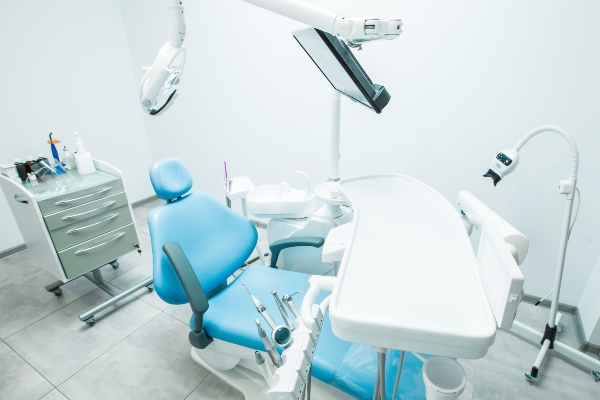When a Bone Graft for Dental Implant Restoration May Be Recommended

A bone graft for dental implant restoration may be recommended by a dental professional to restore the density inside of the jawbone. This should take place before the placement of dental implants if the patient has lost density in their jawbone due to atrophy following tooth loss or as a result of periodontal disease.
A discussion of bone grafting before dental implant restoration
Although needing a bone graft before beginning the dental implant restoration process is not good news, there are benefits that the procedure provides. By understanding why a bone graft may be necessary and what the benefits of the procedure are for your oral health and dental implant restoration long-term, you can help alleviate any nerves you may have beforehand.
A bone graft procedure for dental implant restoration explained
A dental bone graft procedure, also called a bone regeneration procedure, is a part of the dental implant restoration process for many patients. Specifically, the procedure is necessary if the patient has lost bone inside of the jaw. When this occurs, it can lead to a sunken jaw look and makes implant failure more likely. A bone regeneration procedure restores the health and appearance of the jaw.
The bone graft procedure process
A bone graft involves taking bone from another part of the jaw or body and grafting it where the bone loss occurred, which is usually above or below where a tooth is missing. An incision is made into the gums to access the jawbone, and the new bone material is grafted into place. The procedure is considered a form of oral surgery, so sedation is used to help ensure the procedure is painless.
How long does recovery take after a bone graft?
A bone graft only takes one dental visit, and the patient can return home on the same day. Most patients see any post-surgery discomfort go away within a week or two, but it can take longer for the regeneration process to happen. Once the bone has healed, which typically takes several months, the dental implant placement procedure is scheduled.
What to expect after a bone graft
Many patients report feeling as if their jawbone is fuller after the procedure, especially if the bone loss was relatively severe. The placement of the dental implant (or multiple implants) is scheduled once the jawbone heals. This procedure involves minor surgery as well. After the implant fuses with the new jawbone, then the restoration is placed to complete the process, and the patient can enjoy their new and improved smile for years to come.
FAQs: bone graft for dental implant restoration
It is helpful to have all of your questions answered before the procedure to help alleviate any anxieties you may have. The following are several questions about bone grafting before dental implant restoration, including whether or not it is necessary and the different types of bone grafts.
Are bone grafts required before dental implants?
As discussed, a bone graft is not required in all cases of dental implant restoration. Instead, it is typically recommended for patients that have lost bone inside of the jaw due to atrophy or periodontal disease. If the patient has not experienced significant bone loss inside of the jaw, then they can most likely proceed with the placement of dental implants and forego a bone graft procedure.
What are the different types of bone grafts?
An autograft is perhaps the most common type of bone graft when preparing for a bone graft. This involves the removal of bone tissue from other areas of the mouth (e.g. the hard palate or chin). In some cases, bone is taken from the hip or shin. Other types of bone grafts that may be available include an allograft, which uses donor tissue from another person, and a xenograft, which takes donor tissue from an animal (usually a cow or pig). An alloplast procedure may also be an option as well, which is donor tissue that is created from minerals and other natural sources.
Find a long-term teeth replacement solution with a dental implant restoration
A dental implant restoration allows you to replace one or more missing teeth in a manner that feels, functions, and looks natural. Here at our practice, we take genuine pride in seeing our patients achieve a new smile with dental implant restoration that restores their confidence and oral health. To get started, give us a call or send us a message for a prompt reply.
Request an appointment here: https://gkdentaloffice.com or call GK Dental PC at (617) 826-6075 for an appointment in our Everett office.
Check out what others are saying about our dental services on Yelp: Dental Implant Restoration in Everett, MA.
Recent Posts
Dental restorations are used to repair or strengthen damaged teeth and to replace missing teeth. The damage may be the result of routine decay, extensive decay, fractures, weak gums, and many other dental issues. Dentists recommend restorations based on the tooth, its location, the source of trouble, the health of surrounding teeth, tooth color, patient…
Dental restorations have been used for thousands of years. In fact, a 2012 article published by The New York Times details the discovery of a 6,500-year-old human jawbone. Considered the earliest evidence of dental fillings, it had beeswax in one tooth, which researchers believe was to ease the pain of a crack. These days, restorations…
Crowns are commonly used in dental restorations. A crown is a cap shaped like a tooth but hollow in the middle. It fits over a natural tooth that has to be prepared first. Depending on the issue it is correcting, a crown can be used by itself or as a component of another restoration technique.Teeth…
Restorative dentistry refers to any type of dental procedure that a dentist performs to restore a damaged or missing tooth. Dental restorations can encompass several procedures that vary in terms of invasiveness, complexity, and what they can accomplish. However, the overreaching goal of all restorative procedures is to improve the health, function, and appearance of…


